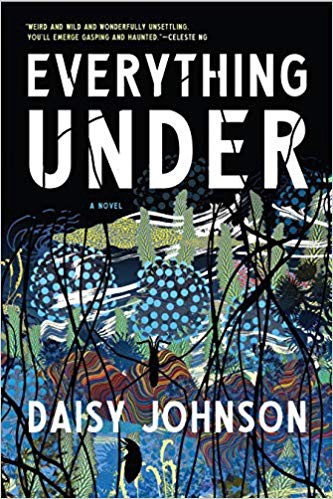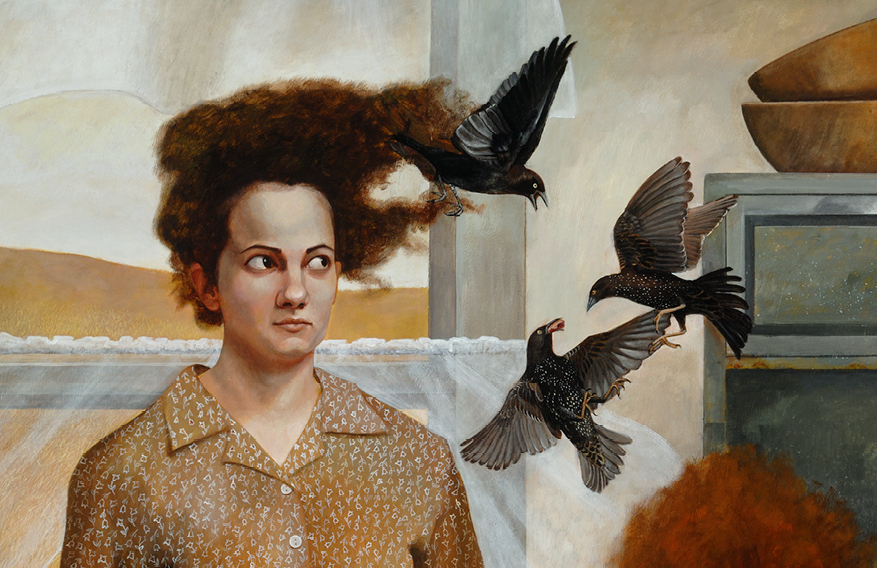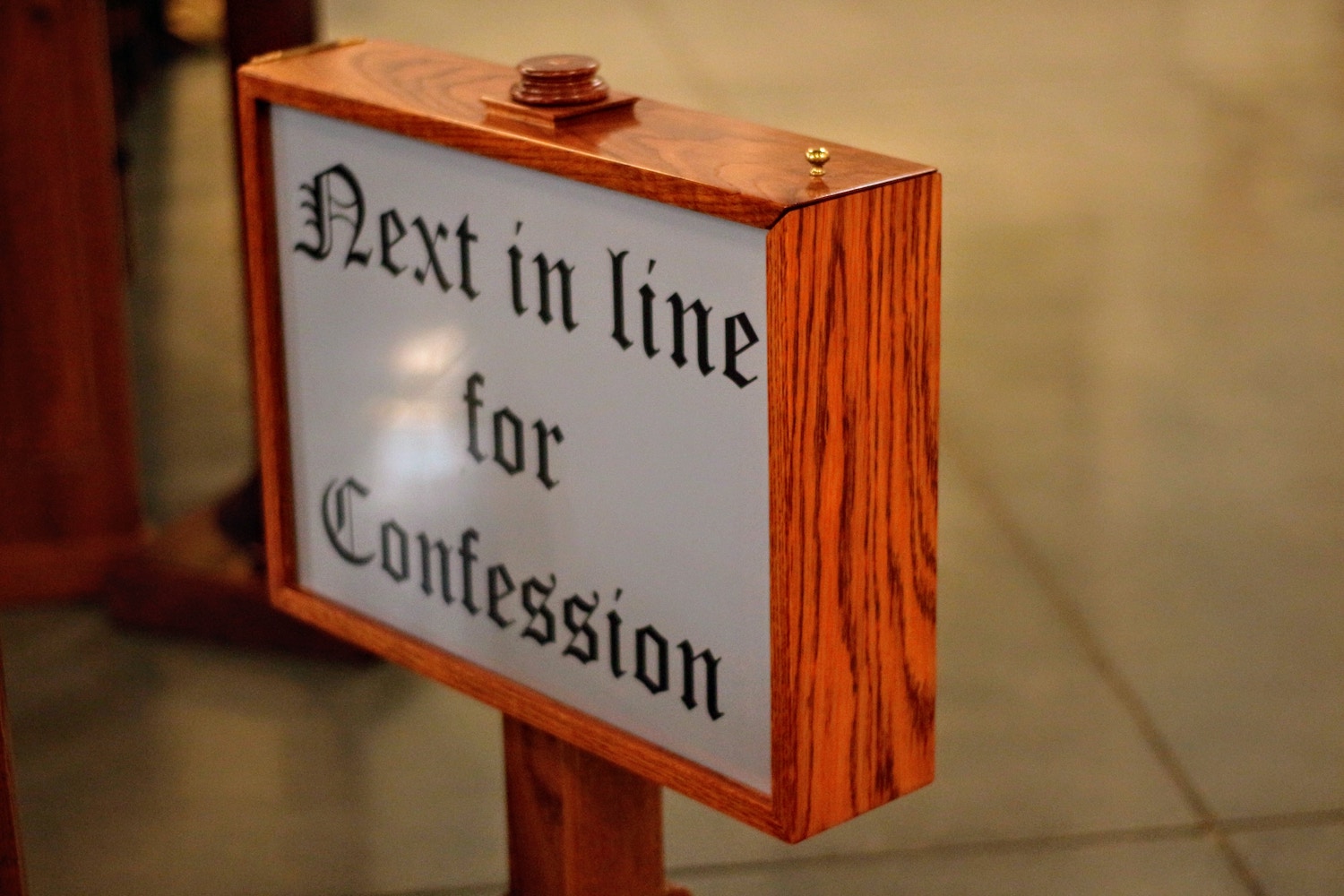interviews
The Chilling Worlds of Booker Finalist Daisy Johnson
The author of “Everything Under” takes lessons from poetry, horror novels, fairy tales, and bad dreams

I n Daisy Johnson’s fiction language and nature come alive, humans experience uncanny metamorphoses, and our biggest fears may take the shape of creatures living in the water.
Johnson proved to be a fearless writer in her collection of feminist tales, Fen. These stories are as daring and unsettling as her writing, which features innovative uses of diction and sentence structure, in addition to sensuous description. Her novel, Everything Under, is equally — if not more — ambitious. In Everything Under, Gretel — a lexicographer — has devoted her life to words. She grew up on the canals of Oxfordshire with her mother, Sarah, and the two lived a wild, reckless life, inventing a language of their own. Abandoned in foster care as a teen, she has neither seen nor heard from her mother in sixteen years, calling hospitals and mortuaries for any sign of her existence. A cryptic phone call sets Gretel on a hunt for Sarah; to find her, she will need to recover long buried memories of their final winter on the river. She recalls their private vocabulary, a runaway boy who lived with them for that brief time and the water creature they had spent years watching out for: the Bonak. In this extraordinary debut, Johnson explodes the myth of Oedipus and, from the remains, creates a singular and powerful story that burrows in the psyche and refuses to leave.
Discovering Johnson’s writing felt like meeting a literary kin. Considering the bounty of material, I was eager to I speak to Johnson about language, nightmares, the horror genre, and the role of animals in her fiction.

Roberto Rodriguez-Estrada: One of the reasons I fell in love with your stories is the poetic texture of the language you use. Have you always written in multiple genres?
Daisy Johnson: When I first started studying writing I wrote poetry and loved its sparseness. I think poetry is a good thing for any writer to try their hand at because it really teaches you how to edit, how to make every single word work as hard as it can. Sadly, once I started living off my writing I found it hard to go back to poetry. Writing is not simply the process of sitting down and producing words it also calls for an immersion in the craft, for reading everything related to your work that you possibly can. Though I still read poetry I do not feel the immersion that I think I would need to feel to write some.
This sounds like both fear and an excuse. At the moment my brain and my hands feel so filled with fiction there is almost not the space for anything else. Perhaps this is something about the type of person I am. I hope to one day go back to all of these things but it would be a wrench to do so because I think it would mean taking a break from fiction.
I think poetry is a good thing for any writer to try their hand at because it really teaches you how to edit, how to make every single word work as hard as it can.
RRE: Language is as thematically significant to your writing as it is stylistically. There are certain phrases that caused my heart to leap or that crept beneath my skin and stayed there. Somehow, there’s a balance of innovative word-choice and syntax, and fantastic storytelling. When drafting and revising your stories, do you tend to follow the story on its course, returning later to edit for style? Or is the story, for you, inextricable from the way it’s told, all of it unfolding at once?
DJ: The language comes first for me. The way a character might speak — or think — the way a landscape might describe itself to someone. The story is only the way it is because of the language used to tell it and the language — the syntax and sentence structure — is only laid out in such a way because of the story it is telling. If I used language in a different way the stories I tell would be different, of that I have no doubt. And with each new story — each new project — there is the slow exploration of how the language should be, of how this story needs to be told.
But also, interestingly, the language and sentence structure is often there from the beginning and what needs to be edited in later drafts is the plot and character. I am not a tidy writer. My first drafts are enormously messy. So there is also something in the process of editing which is entirely necessary both to find the language — although the language is there sooner — and to find what the language is trying to tell. And it is only through endless drafts that this becomes clear. The idea which is there at the beginning needs time to compost and clarify.

RRE: In your story “A Bruise the Shape and Size of a Door Handle,” you bring the character of the house to life, endowing it with the ability to love. It does not, however, love how a human would, and it grows a sort of menacing jealousy from the beginning. How do you build tension on a sentence level?
DJ: I think writers can learn so much from horror fiction but not least the elements of structure and tension.
Stephen King does something very interesting in his fiction using brackets and italics to suggest the thoughts of the character which, I think, make the reader feel almost as if there is an intruder in the fiction. Helen Oyeyemi’s White is for Witching does something similar with the layout on the page wherein the word from an above line will link to a new sentence; this suggests to the reader that they are not in control of what they are reading. Again this is done to great effect in You Should Have Left by Daniel Khelmann where the first person narrative begins to be infiltrated by another voice.
I think horror calls for small moments which build and build, almost unnoticeably, to a great fear. This can be done in a sentence by using unexpected words which can flag to the reader that there is something ahead. Horror is often about past trauma and here there is the question of how we can make our sentences feel as if they are both present and slowly swiveling to regard the past. Perhaps through use of tense or the changing of the tense? I think also use of punctuation is important. Horror is about postponing for as long as possible until the postponing becomes unbearable to a reader. If we postpone the full stop then the reader may feel this sense of an end (and with it the relief of an ending) being held away from them. However, if we use short sentences with little punctuation besides the full stop then there is a suddenness to the reading, a sense of dread which comes with lots of endings flooding around us.
RRE: Wow, this is incredibly insightful! I think there is so much, too, to glean from film: sound and music, like rhythm and tone in horror fiction, both play an incredibly significant task in every horror film I can think of. Especially Hereditary (2018), which uses sound so powerfully to ratchet up the tension. What are some of your favorite horror films?
DJ: I am a huge horror film fan. When other people watch rubbish television to relax I watch scary films. I feel very happy to be living in a time when I think the horror genre is really stretching its muscles and trying exciting new things. I am particularly enjoying the feminist horrors that started emerging. Films like It Follows, The Babadook, Under the Shadow, and Girl Walks Home Alone are really superb in the way they use the genre to talk about things that are happening in our society. I’ve had an incredibly busy few weeks and have spent any down time I could watching the Netflix series The Haunting of Hill House which really scared me and made me very excited to write some horror. I also love the classics. I grew up on The Exorcist, Don’t Look Now, The Shining and The Omen and they will always have a place in my heart.
RRE: I recently had a terrifying dream that was so similar to Everything Under; it was just before I got my copy of it, actually, but I somehow dreamt of living on a boat with one of my uncles and a group of men I don’t at all know. We were at the sea, and they kept talking about a creature that lived out there, in the water. At some point, I vividly recall the walls turning into scales, the boat being part-creature all along, its mouth gaping over the roof. What are some of the myths or folktales or stories that continue to haunt your dreams?
DJ: I love that you dreamt Everything Under before it came to you. I’m not sure a writer can ask more than that.
My night terrors are always about there being something horribly wrong. These are often instinctual feelings rather than a certainty about what the wrongness is but sometimes it is that the walls are moving or that the person in my bed (my poor partner) is not who they should be. Thinking about it now this sense of wrongness (whether in the wrong place or at the wrong time) is something that often runs through fairy tales and folktales. I was thinking about Hansel and Gretel as I was writing Everything Under and certainly that idea of leaving breadcrumbs for yourself which you then can’t find it always the way it feels when I wake up and I know something is wrong but not what. Myth and fairytales are always somehow at a tilt. They are our world but at an angle. The grandma is not a grandma, she is a wolf. The swan is not a swan, it is a god. I think this, at least for me, is the way my bad dreams feel; they are the world I live in but at a strange slant.
Myth and fairytales are always somehow at a tilt. They are our world but at an angle.
RRE: The characters in Everything Under return time and again to certain ideas that, for many, are dubious. The character of Margot is certain of the idea of fate, that “life is a straight line.” As for Gretel, she ponders repeatedly on the idea that “our thoughts and actions are determined by the language that lives in our minds.” To what extent do you believe these ideas yourself? Or are they convictions specific to your characters?
DJ: I am not my characters, thank goodness. I don’t believe in fate because I am not Margot. She believes strongly — partly because of who she is and partly because of the ideas she is introduced to as a child — that life is laid out ahead of us. My parents are quite determined atheists, as I suppose am I; I have never believed in fate. But I am interested in characters who do and what that belief does to the way a person lives their life.
I am really interested by the idea that language determines our lives. Interested and a little alarmed, of course. At times I find myself looking at my weird, ungrammatical language and trying to work out what it has done to me. I have a bad memory; has that come from being awful at spelling? I am easily angered; is that a product of the first words my parents taught me? I am early to everything, have a great fear of being late; is this something you could read in the way I speak and write?
The idea that language determines our nature is an old one and rather out of fashion but it is compelling to me.
I have never believed in fate. But I am interested in characters who do and what that belief does to the way a person lives their life.
RRE: Everything Under updates the Oedipus myth, a story that served as a sort of backbone for modern psychology. The title itself acknowledges what lies buried within the psyche: those traumatic memories our minds — or at least in Gretel’s case — trick us into forgetting. When did you first encounter the myth and what motivated you to revisit such a disturbing tale?
DJ: I recently found my school drama copy of Oedipus Rex which was covered in notes a teenage me had made. At university we looked at Freud — mostly dismissively — in Literary Theory and Oedipus was, as you say, there again. So the myth had been there for a while and I like to think that it had been waiting for the right moment to come out and offer itself up to me for literary salvage.
I came back to it, I think, because of its darkness, its weirdness and animalistic nature. Children are left on the mountainside for wolves, prophecy is believed to devastating effect; there is blinding. I love the momentum the myth has, the sense that we are rolling and rolling towards an inevitable — and awful event — and the lure of trying to do something similar in fiction was exciting.
I think undertaking a retelling is a challenge a writer sets themselves and I certainly felt this way when I started writing. I wanted to know if I could do it, how I might go about it.
‘Circe’ Shows Us How Storytelling Is Power—And How That Power Can Be Seized
RRE: I’m glad you mention the animalistic. Animals show up everywhere in your stories. Especially in places where they shouldn’t. In Fen, a girl falls in love with a fish, and another girl becomes one. There’s a particular line in Everything Under that made my heart miss a beat, which was when — explaining her transgender identity to Margot — Fiona says: “like a fish still alive in the belly of a heron.” What draws you to writing so inventively about animals? Where do you think our anxieties towards the animalistic come from?
DJ: I think what draws me to writing about them is the idea of nature in some way answering back in my fiction. The animals I write about are often somehow strange in the stories, turned nasty or clever. There is an ecological slant, I think, which I never expected to come up but which has. The animals in the work are never quite what they seem.
The animalistic is in us, I suppose that is where the anxiety comes from. We are animals but we hold civilization, decorum and politeness up as important and the animalistic goes against all of this. Perhaps this is another reason why I write about animals. They are both foils and metaphors to place against the humans who, in the end, act like animals themselves.









